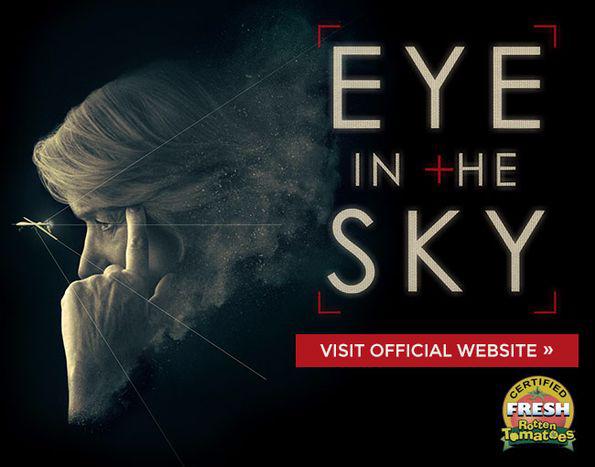Imagine staring through a screen, watching a man about to detonate a bomb in a bustling marketplace. You have the power to stop him, but doing so means orchestrating a drone strike that could kill innocent civilians. This is the chilling premise of “The Eye in the Sky,” a 2015 thriller that dives into the morally complex world of modern warfare and the ethical dilemmas surrounding remote-controlled combat.

Image: www.imdb.com
The film follows a group of British intelligence officers, led by the resolute Colonel Katherine Powell (played by Helen Mirren), as they track a group of suspected terrorists planning an attack in Kenya. They are in a race against time, with the stakes constantly rising, and their only available weapon is a drone strike. “The Eye in the Sky” offers a gripping and realistic portrayal of the pressures and uncertainties of modern warfare, prompting viewers to confront the complexities of drone warfare and the ethical considerations that arise when lives are placed in the hands of a “button pusher” thousands of miles away.
An Immersive Look at the Reality of Drone Warfare
The film is particularly noteworthy for its unflinching portrayal of the realities of modern warfare. From the claustrophobic tension within the intelligence center to the chillingly realistic drone footage, “The Eye in the Sky” transports viewers directly into the heart of the action. It avoids the sanitized, Hollywood-style glamorization of war, instead showing the emotional toll it takes on both the soldiers on the ground and the operators in the control room.
One of the film’s greatest strengths lies in its ability to humanize its characters. We see the moral struggles of both Colonel Powell and the American drone pilot, Steve Watts (played by Aaron Paul). Powell is a dedicated and highly capable intelligence officer, but she is torn between her duty to save lives and her reluctance to take innocent lives. Watts, meanwhile, is plagued by guilt and second-guessing after a previous drone strike resulted in civilian casualties. Their internal conflicts add a profound depth to the film, forcing viewers to grapple with the psychological impact of drone warfare and the responsibility that comes with wielding such powerful weaponry.
Ethical Dilemmas at the Forefront
“The Eye in the Sky” masterfully raises ethical questions surrounding drone warfare. It confronts viewers with hard choices and encourages them to consider the implications of using remote-controlled weapons. The film explicitly depicts the dilemma of collateral damage – the unavoidable possibility of killing innocent civilians in the line of fire. It doesn’t shy away from showcasing the emotional toll of taking a life, even when it’s perceived as a necessary action. The film doesn’t offer easy answers, instead forcing the audience to confront the ambiguity of modern warfare and grapple with the ethical complexities involved.
The film meticulously explores the legal and political ramifications of drone warfare. The characters grapple with the authorization process, the legal guidelines surrounding targeted killings, and the role of politics in shaping military operations. It delves into the power dynamics between different nations involved, revealing the inherent complexities of international relations and the complicated web of alliances. Through these explorations, “The Eye in the Sky” invites viewers to consider the legal frameworks that govern drone warfare and the challenges of achieving accountability in the age of remote-controlled combat.
A Commentary on the Power of Modern Technology
Beyond the immediate ethical dilemmas, “The Eye in the Sky” also acts as a commentary on the pervasive influence of technology in modern society. The film highlights the power and potential pitfalls of advanced technology, particularly in the context of warfare. The drone strikes, carried out from a sterile control room thousands of miles away, represent a disturbing trend of dehumanizing the act of warfare. The film raises concerns about the potential for technology to distance us from the consequences of our actions and to create a culture of detached violence.
It delves into the anxieties surrounding the increasing reliance on technology in decision-making processes. The film presents a powerful image of the disconnect between the decision-makers operating high-tech systems and the real-world consequences of their choices. This disconnect underscores the critical need for ethical considerations and robust oversight in the development and deployment of advanced technologies, particularly in fields like military warfare.

Image: bleeckerstreetmedia.com
A Conclusive Statement on Morality and Warfare
“The Eye in the Sky” delivers a powerful and thought-provoking experience that lingers long after the credits roll. It is a film that challenges viewers to think critically about contemporary warfare, its ethical implications, and the role of technology in the modern world. It refuses to offer a simple solution, instead prompting audiences to grapple with the intricate interplay of morality, technology, and geopolitics.
The film serves as a reminder of the human cost of warfare, even in the age of remote-controlled combat. It emphasizes the importance of empathy and critical thinking in navigating the complexities of modern warfare. “The Eye in the Sky” is a powerful exploration of the ethical dilemmas of drone warfare, leaving audiences questioning the nature of modern warfare and the choices we face in a world increasingly shaped by technology.
The Eye In The Sky Full Movie
https://youtube.com/watch?v=uhgx8zBs-wQ
Conclusion
If you’re seeking a film that presents a thought-provoking and realistic depiction of drone warfare, “The Eye in the Sky” is a must-watch. It’s a film that sparks important conversations about the ethics of modern warfare and the complexities of using technology in the pursuit of peace. Whether you agree with the moral choices made in the film or not, it will undoubtedly leave you with something to think about, urging you to consider the implications of technology and the choices we face in a world increasingly reliant on remote-controlled systems.





